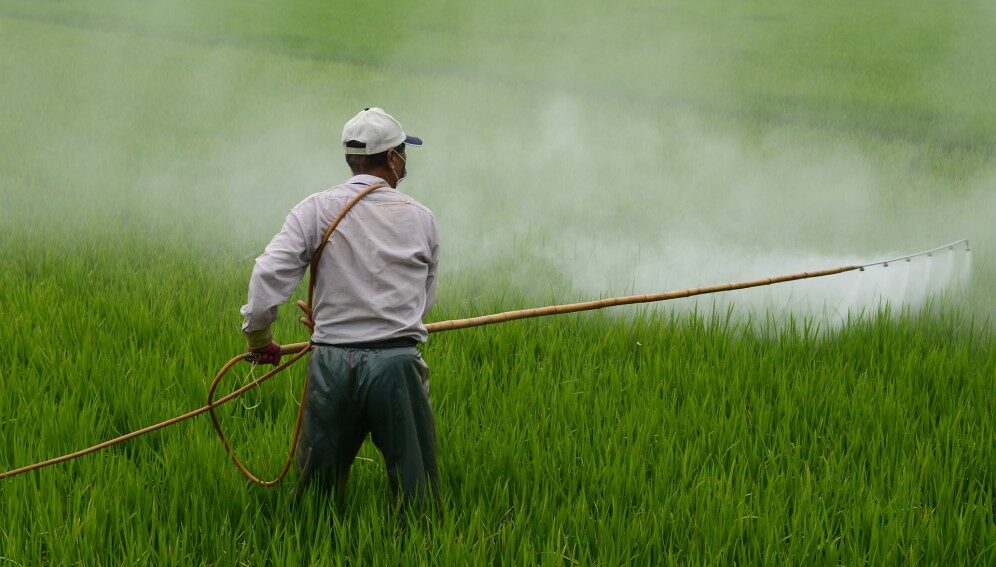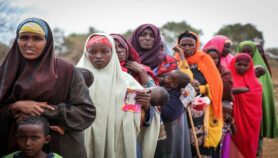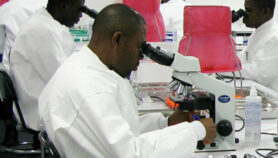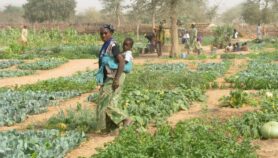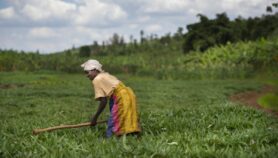By: Francis Kokutse
Send to a friend
The details you provide on this page will not be used to send unsolicited email, and will not be sold to a 3rd party. See privacy policy.
This article was supported by the Plantwise Plus programme
[ACCRA] Pesticides use across Africa has increased, but it is unclear whether farmers, especially smallholders, know more about its use or its effects on their farms and human health.
SciDev.Net spoke to Lilian Gichuru, a programme officer of Seed System Assessment Tool (SEEDSAT) at the Alliance for a Green Revolution in Africa (AGRA).
What are pesticides?
Pesticides are substances or combinations of substances intended for preventing, destroying, repelling, or mitigating pests. They work by affecting the nervous system of target pests. However, broad-spectrum pesticides may affect some non-target organisms.
How prevalent is the use of pesticides among farmers in Africa?
Agricultural pesticides have made it possible to increase production of crops and livestock. Since their introduction during colonisation, the use of pesticides has been growing among Africa’s farming communities, especially due to the continuing agricultural intensification.
Africa depends widely on agricultural pesticides to protect crops from damaging diseases, insects and weeds. Although only about five per cent of pesticides are sold in Africa, the use of pesticides, particularly in West Africa, is on the rise.
For example, according to a market firm Statista, pesticides use in agriculture in Sub-Saharan Africa increased from 64,000 metric tonnes in 2000 to 108,000 metric tonnes in 2019.
What are some of the reasons for the increased use of pesticides in Africa?
Food production in Africa is mostly practised in tropics, which creates a favourable environment for pests and diseases to thrive.
In fact, insect pests cause almost half of the crop losses in Africa. The use of pesticides is a way for farmers to control pests to avert food losses and meet the growing food demand, particularly as Africa’s growing population is putting immense pressure on food supplies.
There are serious concerns about the health and environmental risks of pesticides, how real are these concerns?
Chemical pesticides provide a range of benefits and are a vital part of crop protection. The lack of effective handling and use of pesticides, however, has adverse effects on the environment and health. These dangers are present even though Africa, compared with other regions of the world, uses pesticides in moderation.
“Governments and other organisations should focus on developing technological alternatives to synthetic pesticides, including deploying biological pesticides.”
Lilian Gichuru, Alliance for a Green Revolution in Africa
Africa must learn how to handle pesticides to minimise the threat to biodiversity.
What are the consequences of unregulated use of pesticides in the region?
Pesticide management has improved significantly, with international agreements playing a role. However, regulations have not been sufficient to deal with all adverse environmental and health impacts. Also, knowledge gaps still exist that hamper a full understanding of some of the mechanisms and processes leading to the adverse impacts of pesticides.
To achieve a chemical safe future with minimal adverse impacts from pesticides, both incremental and transformative actions are required that tackle root causes and shift market demand, coupled with supportive and enabling measures.
Among these are increased control over pesticide distribution and use through an enforcement of relevant legislation, and scaling up international pesticide evaluations. Also, there is a need to reduce or eliminate the risks, registration and use of hazardous pesticides, while enhancing the post-registration monitoring of pesticides. This needs to be supported by the development and availability of low-risk pesticides, biopesticides and bioprotectants, with many such efforts currently ongoing.
Has the increased reliance on pesticides led to the contamination of African freshwater sources and threatened wildlife?
Chemicals that kill pests can also kill beneficial insects, including bees and beetles, which are essential to a healthy ecosystem. Further, if chemicals are overused, leaving residues that exceed recommended levels, the result might be a contaminated harvest that sickens or even kills people and animals. Scientific studies have shown that excess amounts of a pesticide in the body can cause birth defects, tumours, genetic changes, blood and nerve disorders, endocrine disruption, coma and death, depending on the dosage and chemical involved.
What are some of the banned pesticides in other jurisdictions, but still being used, especially in low- and middle-income countries?
Some of the known banned chemicals include aldrin, binapacryl, captafol, chlordane, chlordimeform, DDT, ethylene dichloride, heptaclor, lindane, parathion, phosphamidon, and ethylene oxide.
Others that have been banned in other jurisdictions include chrlorpyrifos which has been linked to neurological damage in children, including low IQ and attention deficit disorders.
The Rotterdam Convention is an international treaty that requires exporters to alert importing countries, to chemicals, which have been banned or severely restricted by other governments.
How does the use of pesticides impact the value of African farm products in the local and international markets?
The use of pesticides sparingly has shown direct gains.
Pesticides play an essential role in preventing yield losses from weeds and diseases.
International agriculture food produce traders depend on consistent quantity and quality of supply, often bought through imports and the use of long-term contracts with large and well-capitalised farms, where it is much easier to monitor farmer activity, streamline production processes, and control some production inputs.
Africa still has low use of pesticides, which adversely impacts the continent’s production capacity and competitiveness in the international markets. Africa must, however, balance pest management and the severely compromised food systems.
What are some of the best practices regarding pesticides application by farmers?
When crop pest and disease emergencies and epidemics occur in an area, agricultural officials and farmers often need a fast way to manage the crisis. Some farmers light fires or create clouds of smoke by burning refuse. They may also throw stones or wave sticks at the invading swarms or even scream to scare them away, but these methods are in most cases ineffective. Emergency situations thus lead to strong increases in synthetic pesticide use.
With the proper policy focus and training, spraying can be done safely and responsibly. At the same time, governments and other organisations should focus on developing technological alternatives to synthetic pesticides, including deploying biological pesticides.
What are your recommendations on the way forward regarding the use and misuse of pesticides in Africa?
Considering climate change and the ever-growing resistance to existing pesticides, we need to continually invest in research.
On this front, AGRA supported national agriculture organisations’ efforts in 2018 to identify effective and benign insecticides for fall armywormcontrol, assess yield losses, and establish action thresholds. Furthermore, the intervention aimed to improve the capacity of stakeholders to identify and manage fall armyworm, especially through packaging.
The UN Food and Agriculture Organization has developed a comprehensive guide to help millions of smallholder farmers cope with the fall armyworm, and recommended using biological control and local remedies instead of insecticides.
To encourage the shift to alternatives, enhanced enforcement of regulations, in both high income and low- and middle-income countries, will be critical. However, regulators in many low- and middle-income countries often take years to approve new pesticides, meaning that older – and possibly more harmful — products are more likely to be available.
As well as enforcing regulations, communication will be key to managing and diminishing the risks of pesticide use in low- and middle-income countries.
This interview has been edited for clarity and brevity.
This piece was produced by SciDev.Net’s Sub-Saharan Africa English desk.
This article was supported by the Plantwise Plus programme, run by CABI, SciDev.Net’s parent organisation.
CABI through its Plantwise Plus programme supports countries and farmers to grow and supply safer and higher quality food through sustainable approaches to crop production. It specifically aims to address the food safety challenge in Kenya, with a focus on pesticide risks in domestic markets by engaging policy makers and relevant stakeholders in a Policy Summit in 2023.
The Policy Summit will be a multi-stakeholder forum to deliberate on mitigating pesticide residue risks for safe fresh fruits and vegetables in Kenya. It will bring together participants to review existing evidence on pesticide residues that could exceed Maximum Residue Levels (MRLs) and other risks in produce entering domestic markets, root causes and gaps in current initiatives, and identify areas requiring joint action to address identified risks. Stakeholders will be drawn from government, research, academia, growers, consumers, regional organisations, industry actors, media, and non-governmental organisations.


